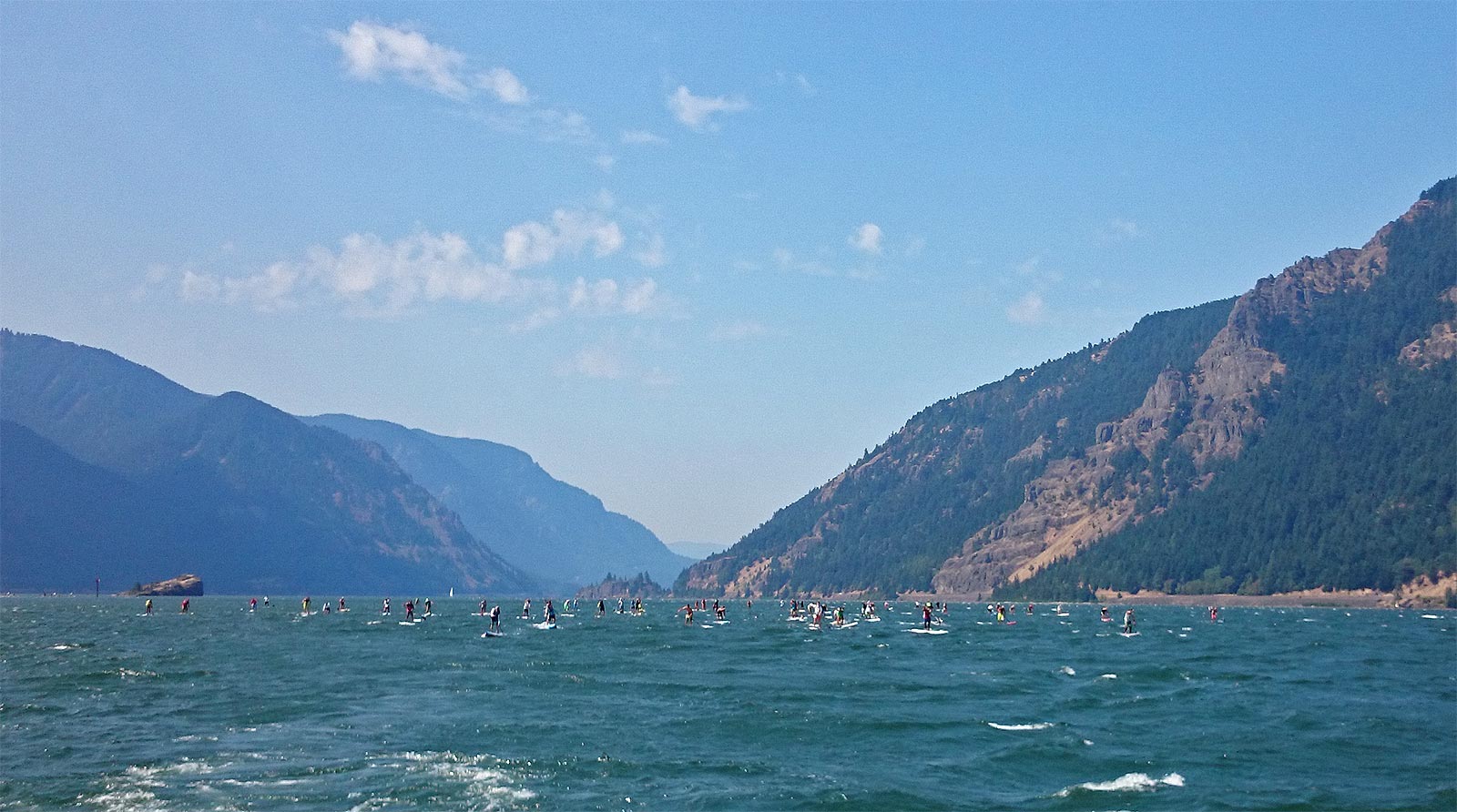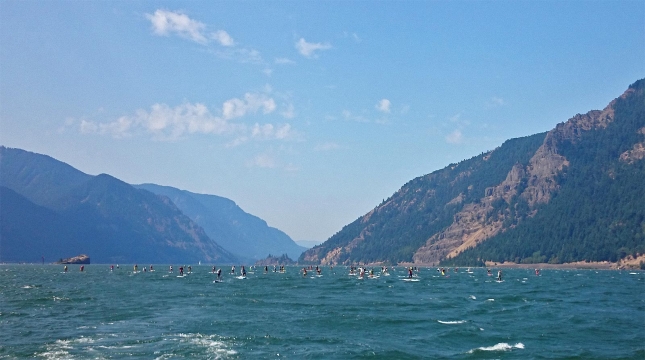
Gorge Paddle Challenge Update: A Note about the World Rankings

The Naish Columbia Gorge Paddle Challenge is one of the biggest and best events of the season (photo: SUP Racer)
Another week, another big race.
After the excitement of the JM Survivor Race in Huntington just a few days ago, it’s time for another big showdown this weekend, with the Naish Columbia Gorge Paddle Challenge set to be one of the best and most competitive events of the season.
There’s a huge lineup of talent hanging out in Hood River for the 6th annual edition of this iconic event, and with such a high level of competition on the start line, there’s bound to be plenty of movement on the SUP Racer World Rankings come Monday morning.
But while the Gorge is an awesome event, it’s actually really difficult to factor into the rankings system, as it’s two separate races in one weekend (the Elite Course Race and the Double Downwinder), whereas most other events around the world are either just one race or two races combined into one overall result.
So for that reason I’ve made a few tweaks to how the Gorge event will score on the Race Index this year, which should not only simplify things but also make it as fair and accurate as possible.
The short version: The Gorge will continue to count as two separate results, just like it always has in the rankings, however there will be much more emphasis on the main event, the Double Downwinder, in order to prevent the whole weekend from having too much of an impact on the overall season.
The Elite Course Race will be worth a maximum of 40%, i.e. it’s capped as a 4-star race, while the Double Downwinder will collect the minimum of 6-stars (60%) that the Gorge was awarded at the start of the year, which is on the same top level as Carolina and the PPGs.
That’s the short version anyway.
If you really want to keep reading, here’s the long version (you were warned).
Ok for starters, this entire explanation assumes you’re already familiar with the SUP Racer World Rankings, in particular the Race Index that scores each race around the world from 0-100% based on the elite level of competition that’s participating (the Race Index is the basis of the entire rankings system). If you’re not familiar, go check it out before proceeding, otherwise this explanation will probably become a little confusing.
So there’s been a strong movement towards “one event, one result” in the World Rankings system this year, which is an attempt to simplify and unify the scoring of events across the season. Personally I prefer “one event, one race format” rather than “one event, two totally separate races, one result”, but if there are going to be two totally separate races in one weekend, I’d prefer to see one overall champion crowned, rather than watering it down by producing two separate winners within the event.
(And before things become too confusing: Yes, there are actually three races at the Gorge, the course race and then the two downwind runs where times are combined to form the Double Downwinder, but to keep things somewhat simple I’ll refer to the ‘Double Downwinder’ as one race.)
So anyway, “one event, one result” is the standard this year.
But like I said up top, the Gorge is really difficult to combine into one result, because the two races (the Elite Course Race and the Double Downwinder) have totally separate results and prize money. This is nothing against the organisers at all, I think their format works well within the event itself, it’s just a bit of a challenge to factor into the rankings that’s all.
On top of this, there’s also the fact that several paddlers plan to skip the Elite Course Race and only do the Double Downwinder (because after all, that’s what everyone makes the pilgrimage to Hood River for: downwind paddling), so having a combined result would virtually disqualify all of those competitors from the overall results.
So basically, combining the results at the Gorge is a bad idea (at least as far as the World Rankings points are concerned), even though it would have aligned the Gorge with other “combined” events such as the Pacific Paddle Games, World Series, Japan Cup, etc.
The only real option I had then, as far as the World Rankings are concerned (again, this has nothing to do with how organisers run the event itself — I think they do a terrific job), was to either ignore the course race and award 6-star points to the Double Downwinder only, or simply just award two separate results, one for the course race and one for the Double Downwinder, which is what I’ve done for the past three years.
But each of those options has a fatal flaw:
– Having just one result, i.e. only giving World Rankings points for the Double Downwinder, would penalise those athletes who had a great result in the course race. Because even though the Double Downwinder is clearly the main event this weekend, the Elite Course Race will still be a hotly-contested race.
Having just one result (i.e. on the Double Downwinder) would also create a bit of a mess when we update the leaderboards on Monday morning, because we’d be dropping 2x results from the Gorge 2015 and replacing it with just 1x result from the Gorge 2016. The majority of athletes who competed at the Gorge last year would get penalised and lose points on Monday morning, no matter how well they did this year.
– On the other hand, having two separate results at a 6-star/60% level would give the Gorge far too much weighting on the overall season rankings, because all other events only count for one single result.
(Note: Having 2x 60% races in one weekend doesn’t necessarily mean the event is worth 120% overall – I’ll explain this in more detail below – however it still would give the event too much weighting.)
So in the end the only compromise (there’s no perfect solution) is to keep two separate results, but to give the “main event” (the Double Downwinder) more of an emphasis.
The result: 40% (maximum) for the Elite Course Race and 60% (minimum) for the Double Downwinder (which itself, like I said above, is actually a single result based on combined times from two downwind runs, i.e. there are three races at the Gorge, but let’s not go too far down the rabbit hole here).
(And also, before I continue: Yes, the Gorge does award one overall result to the best performers of the weekend, the “Waterman” and “Waterwoman” award, based on the best overall combined times from the course race + the double downwinder. So in theory I could have expanded this “combined times” methodology all the way down the results sheet to produce a single, overall result for everyone, and then award the world ranking points based on that one combined result. But the problem there is that the downwinder is going to produce huge time gaps, and there are two downwind runs to amplify those gaps, whereas the course race is usually very tight, so combining everyone’s overall result based on time would make the course race almost irrelevant. Alternatively, I could have combined the two races based on the “1 point for 1st, 2 points for 2nd” method, but then I may have ended up awarding a different overall winner than the event itself, which would be really confusing and just plain wrong, plus I don’t really agree with that 1/2/3 points method anyway. Long story short: Combined results at the Gorge are a bad idea as far as the World Rankings are concerned.)
So anyway this “60+40” compromise solves a few problems:
– The Gorge event will still produce 2x results, just like it always has, which means the rankings won’t get all messed up on Monday morning by replacing 2x results with 1x.
– The paddlers who perform well in the Elite Course Race will still get some credit for their strong performance.
– The paddlers that only want to race in the main event, the Double Downwinder, won’t have to compete in the course race just for the sake of achieving an overall result.
– And by giving the course race a *maximum* of 40%, the weekend won’t have too much of an impact on the overall season.
And it’s this last point I probably need to explain in a little more detail…
Looking at it on the surface, you’d assume that having a 60% race and a 40% race within one event still gives the Gorge way too much weighting in the overall scheme of things, because 60+40=100, right?
Wrong.
As far as the World Rankings are concerned, 60 plus 40 does not equal 100, because it’s not only the points on offer that matter, but how many points each athlete is dropping. i.e. it’s their net gain of points that really matters, not the gross amount of points they earn.
Or think of it this way: It’s much better, at least for the top ranked athletes, to win one really big race rather than several medium sized races.
As an example, let’s look at Connor Baxter’s current points situation and scenarios for this weekend.
If Connor were to win both the Elite Course Race (40 ranking points for the winner) and the Double Downwinder (minimum of 60 points — it’ll actually probably score in the mid 60s on the men’s side, but let’s keep it at 60 for this example), his net gain would be 37 points, i.e. he’d go from his current 230 total points up to 267.
But Connor would achieve that exact same net gain of +37 points by winning just one single 64% race.
Or in other words, one 40% race plus one 60% race is worth exactly the same as one single 64% race, at least for Connor Baxter.
60+40=64, not 100.
(On a side note: Connor is actually in a really good position heading into this weekend, as neither of his results from Gorge 2015 are in his best five, so he has nothing to lose and everything to gain, as opposed to the two guys behind him, Travis Grant and Titouan Puyo, who are dropping a lot of points from Gorge 2015 and therefore need solid results at Gorge 2016 just to stay even.)
This “60+40=64” quirk in logic is a result of Connor holding a really good 5th best result, which means that a 40% win is almost worthless to him. As we look further down the leaderboard, a 40% race becomes more valuable, because the lower ranked guys are holding onto a lesser 5th best result than Connor, but the same logic still applies to everyone at the pointy end of the rankings: 60+40 doesn’t equal 100.
To summarise: Awarding the Gorge two separate results doesn’t mean it’s going to have an overbearing impact on the overall season rankings. It’s not going to suddenly become some magic “10-star” event.
Anyway, hopefully that answers everything, and hopefully you’ll agree this is the best compromise to a complicated and, at least if you’re a stats geek like me, quite interesting problem.
But perhaps one more question: Why was the course race limited to 40% but the Double Downwinder given free reign to score 60% or more? Why is the downwinder more important?
Well, quite simple really: Because everyone goes to the Gorge for downwind paddling, not course racing, so it seems pretty clear that the downwinder is the main event.
In fact, several paddlers asked me if I could just ignore the Elite Course Race completely and only award points for the Double Downwinder, because that’s all they cared about. But as I’ve summarised above, that creates problems, at least if I do it all on one go. So instead think of it as the course race being “phased out” over a two year period, rather than being dropped all at once.
Basically the course race is getting slowly dropped from the world rankings system. Next year I’ll probably drop it from the system completely, which is similar to what I did with the Lost Mills in order to change that event from 2x results to 1x.
In fact – and I’m going out on a limb here – I wouldn’t be surprised if the organisers drop the Elite Course Race next year as well, though I’m not going to try and speak on their behalf. It’s their event and they know exactly how to make it as successful as possible. They’ve always done an awesome job and we all owe them a debt of gratitude for what they’ve given the sport, though things can always be improved I guess, so while we’re on the topic, here’s my take on the event format…
Get rid of the Elite Course Race next year. Just leave the course race as an open and junior event, and then have most of the focus on the Double Downwinder.
Actually don’t even stop at a “double” — make it a “Triple Downwinder” and really go all in with the wind.
Have a window from Friday (or even Thursday) to Sunday where you pick the best conditions for downwind racing. Maybe even do 4x downwind races and then competitors can drop their slowest time, giving them 3x runs that count (hence the “Triple Downwinder”). Then you can combine the times to make an overall leaderboard that gets updated over the 3 or 4 days of the event (and then in turn you’ve got one single result for the World Rankings).
I think the paddlers would be pretty stoked on this sort of event format.
Actually I think the only reason the Elite Course Race is still there is because it’s a bit of a crowd-pleaser. The organisers want to keep the crowd entertained at the main event site (the downwind race is virtually impossible to watch). Keeping the crowd entertained is important for many reasons, however that can also be achieved through other means.
Just have some sort of “exhibition race” with the pros that can entertain the crowd, such as a fun relay, a big SUP race, an exhibition sprint format, a dash for cash or anything like that. Make it mandatory for the pros to be involved in this fun race if they want to be eligible for the big prize money in the Double (or “Triple”) Downwinder, and then you’d still have a pro race that entertains the crowd, but the top athletes would be able to focus all their effort on the one thing they came to Oregon for: Downwind paddling.
It’s win win.
But anyway I’m getting way ahead of myself. That’s a discussion for next month…
For now, all you need to know is that the Gorge will count for two results on the SUP Racer World Rankings this year, just like it always has, but that it won’t have *too much* of an impact on the overall season, because the course race is now worth a maximum of 40%, and the Double Downwinder is a totally separate result worth a minimum of 60% (and the Double Downwinder is one single result combined from the two downwind runs, just to confuse you a bit more).
It’s not a perfect solution but I think it’s a pretty good compromise.
And of course the World Rankings are just one tiny part of this great event, so this really isn’t all that important anyway, I just thought I’d go into some extremely fine detail to explain my logic and reasoning.
Congrats if you read this far.




You must be logged in to post a comment.